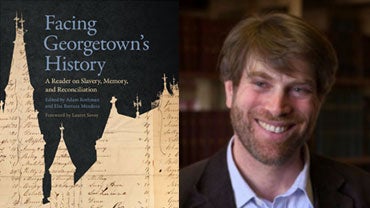
For several years, Georgetown has been reflecting on and responding to its historical connection to slavery. A new book published by Georgetown University Press taps into both archival documents and the work of modern thinkers to deepen our understanding of this history and its legacy.
Facing Georgetown’s History is an anthology of scholarly essays, articles from popular media, and primary source materials that tell the story of Georgetown’s historical entanglement with slavery. The anthology was edited by Adam Rothman, professor in Georgetown’s Department of History, and Elsa Barraza Mendoza (G’21), assistant professor of history at Middlebury (Vt.) College. It includes a foreword by Lauret Savoy, professor of environmental studies at Mt. Holyoke College in South Hadley, Massachusetts, and author of the award-winning book, Trace.
The Jesuits of the Maryland Province of the Society of Jesus owned slaves, and in 1838 sold 272 enslaved people to planters in Louisiana, using the profits to benefit Georgetown. “It’s a microcosm of the history of American slavery,” observed Rothman.
The first section of the book traces the history of slavery through documents found in the archives at Georgetown and other institutions, as well as essays that provide context to those records. The second focuses on memory and reconciliation, with pieces by Ta-Nehisi Coates; Alondra Nelson; the Georgetown University Working Group on Slavery, Memory, and Reconciliation; and others. “We tried to think about how slavery is represented today and ways people have thought about trying to heal cultural, psychological, and economic traumas,” Rothman said. This section also includes several pieces by descendents of people sold by the Maryland Jesuits in 1838, which Rothman identifies as some of the most important in the book.
While other scholarly monographs have investigated the Maryland Jesuits’ history with slavery and the 1838 sale of the Maryland Jesuit slave community, “there’s no book that brings together this variety of information and thought about slavery at Georgetown,” Rothman said. The format gives a variety of points of access to what he acknowledges is a complicated and challenging history.
Rothman has taught the Facing Georgetown’s History class for several years, while Mendoza is associate curator of the Georgetown Slavery Archive and wrote her dissertation on the history of slavery at Georgetown. Many of the materials chosen for the book were “the archival materials that have proven most compelling to students, and the essays by scholars that have been foundational to understanding slavery,” Rothman said.
As home to the University Archives, “the Library is archival ground zero for all of this history,” Rothman said. More generally, the Library has been a site for learning and healing. The Library is currently digitizing the Maryland Province Archives and publishing items from before 1900 in DigitalGeorgetown, providing a valuable resource on the history of slavery and Catholic history. Before the pandemic, Rothman joined descendents in the Booth Family Center for Special Collections, looking at materials that frequently had tangible connections to their ancestors. “It’s often bittersweet and painful, but it’s valuable for healing as well,” Rothman observed.
Due to Omicron, the Library has postponed a launch event with Rothman and Mendoza in the Booth Family Center for Special Collections that was originally planned for February 10. Watch for details about a rescheduled event as pandemic conditions permit.
